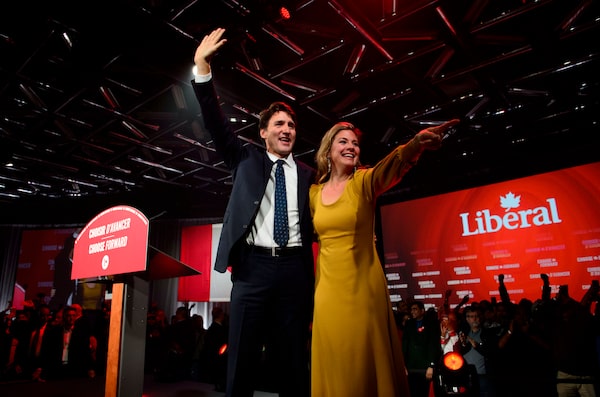
(Sean Kilpatrick/The Canadian Press)Sean Kilpatrick/The Canadian Press
Good morning,
Canada has elected another Liberal government – but Justin Trudeau’s party has been reduced to a minority mandate. The Liberals took 157 seats, shy of the 170 needed for a majority.
Here are the key takeaways:
- Andrew Scheer’s Conservatives made gains in Western Canada, but regional divisions hurt his party in Quebec.
- The Bloc Québécois rebounded from a 10-seat tally in 2015 to 32 this time, as Yves-François Blanchet banked on the agenda of the provincial CAQ government.
- Despite signs of a “Singh surge,” NDP momentum fizzled en route to a fourth-place finish with 24 seats.
- The Greens upped their seat count to three, winning on Vancouver Island and Fredericton.
- Former attorney-general Jody Wilson-Raybould was elected as Parliament’s lone independent, in a narrow race in Vancouver.
- Maxime Bernier lost his seat in Quebec to his old party, the Tories, with the People’s Party failing to win over voters.
This is the daily Morning Update newsletter. If you’re reading this on the web, or it was forwarded to you from someone else, you can sign up for Morning Update and more than 20 more Globe newsletters on our newsletter signup page.
What this means for the Liberals: With a minority government, Trudeau will need to rely on other parties to pursue his agenda, though it’s not yet clear where he will turn. Campbell Clark says Trudeau must change his tone in his second term in order to pull off old-school tactical manoeuvring while taking a co-operative stance.
What this means for the Tories: The election was Scheer’s to win, writes Adam Radwanski, but he failed to expand beyond the Tory base. Now, questions will be raised about his leadership and likability after the party ran the campaign they wanted, says Radwanski.
What this means for regions across Canada
Quebec: Blanchet is vowing to use the sway of the Bloc’s strong showing to oppose any attempt to pass a pipeline through Quebec, and will not compromise on provincial secular-values measures that include the controversial Bill 21. He said the Bloc would co-operate on an ad-hoc basis “if it is good for Quebec.”
Konrad Yakabuski writes that the province’s results have “as much to do with Blanchet … as with a failure by the Liberals and Conservatives to take the Bloc seriously enough until it was too late.”
B.C. and Alberta: A key question in a minority scenario – the outcome downtown Calgary feared most – will be the fate of Trans Mountain and other energy projects. The Tories won all but one seat in Alberta, exposing deep resentment with Ottawa Trudeau must confront. Many in B.C., meanwhile, are hoping the weakened Liberals will pursue a bolder climate agenda to earn support from the Greens, NDP and Bloc.
Gary Mason writes that the angst from Western Canada toward the Liberal government “will be a huge challenge, because every argument around this matter begins and ends with oil.”
Ontario: With one-third of the country’s total seats, Ontario was a critical election battleground that helped the Liberals win — though the NDP could not crack through in ridings they had hoped to take from them. While much of rural Ontario supported the Conservatives, the party did not get the support it needed in urban centres.
Atlantic: Four years ago, the Liberals swept across the east. This year, the party conceded ground while the Green Party finally had their much hoped-for breakthrough in Fredericton. With four parties winning seats in Atlantic Canada, the region will now have voices in Ottawa from both inside and outside caucus speaking for it.
The economic outlook
A Liberal victory means that for the next four years, we won’t be seeing many new bold ideas compared to what we’ve seen for the past four, writes David Parkinson. “So prepare for a government deeply committed to muddling through with the status quo.”
However, the Liberals will still need to make big decisions on taxes and spending in a slowing economy, but especially focus on reducing risks in the housing market. “This could be the big economic risk of the next four years,” writes Rita Trichur.
Got a news tip that you’d like us to look into? E-mail us at tips@globeandmail.com Need to share documents securely? Reach out via SecureDrop
ALSO ON OUR RADAR
Toronto Raptors season opener and championship celebration: On Tuesday night at 8 p.m. ET, the Toronto Raptors begin the 2019-20 NBA season at home against New Orleans. Catch up on all our coverage here.
Syrian Kurds throw potatoes at departing U.S. forces as end of ceasefire looms: Syrian Kurds within the zone the Turkish offensive seeks to capture displayed their anger and feelings of betrayal as a line of departing U.S. Humvees withdrew from the region after more than 16 years of fighting side-by-side with the U.S.
Bianca Andreescu becomes highest-ranked Canadian in WTA Tour history: The 19-year-old from Mississauga jumped one spot to No. 4 in the rankings ahead of the WTA Finals, which begin on Sunday in Shenzhen, China.
Boeing may face billions more in losses as 737 Max crisis deepens: A new revelation plunged the world’s largest plane maker into a crisis involving its flagship single-aisle aircraft, as brokerages cite fresh uncertainty over the time frame for lifting a safety ban imposed after deadly crashes.
Israel’s Benjamin Netanyahu fails to form new coalition government: While Netanyahu remains at the helm of his Likud party, his announcement marked the second time this year that he has been unable to form a government.
MORNING MARKETS
Earnings weigh on European stocks, sterling lower before Brexit votes: European shares edged lower on Tuesday as talk of progress in China-U.S. trade talks was offset by mixed corporate earnings, while sterling retreated ahead of another vote on Brexit. Tokyo’s Nikkei was closed, but Hong Kong’s Hang Seng gained 0.2 per cent, and the Shanghai Composite rose 0.5 per cent. In Europe, though, London’s FTSE 100 and the Paris CAC 40 were down by between 0.1 and 0.4 per cent by about 4:15 a.m. ET., with Germany’s DAX up marginally. New York futures were down. The Canadian dollar was relatively steady at 76.44 US cents in the wake of Monday’s federal election.
TODAY’S EDITORIAL CARTOON

(Brian Gable/The Globe and Mail)Brian Gable/The Globe and Mail
LIVING BETTER
Dealing with your children or your coworkers to facilitate conversation about body odour are tricky to navigate. Should you say something or keep your mouth shut? How can you manage to talk to them in a sensitive way, without offending them? Read David Eddie’s advice in his Damage Control column and see why he has different advice on how to deal with your children and co-workers. If you’re in a sticky situation you can send your dilemmas to damage@globeandmail.com.
MOMENT IN TIME
Fischer-Price recalls millions of toy cars because wheels kept catching fire
(Associated Press)The Associated Press
Oct. 22, 1998: If not for the fires and injuries, Fisher-Price’s Power Wheels electric car was a delightful plaything for aspiring motorists. The ride-on cars and trucks, brightly coloured and battery-powered, let young children step on the gas and drive, just like mom or dad. They cost US$70 to US$300, and could reach speeds of eight kilometres an hour. But overheated electrical components burned some kids’ hands, legs and feet, and U.S. buyers reported 700 electrical problems and 150 fires in homes and garages caused by the toy vehicles. On this day in 1998, Fisher-Price agreed to recall and repair 10 million of them, in what is thought to be the largest recall of a store-bought toy. Fisher-Price blamed the fires on consumers who tampered with the fuses on the cars. But the U.S. Consumer Product Safety Commission said it tested the cars and found they were defective. The head of the government agency complained in a New York Times story that the toys were in stores two years longer than they should have been because the manufacturer did not co-operate. Fisher-Price still makes Power Wheels, offering “hours of motoring fun for your little ones” in a dune buggy, Ford F150 or a Barbie Camper, the latter of which was recalled this year due an injury hazard linked to a faulty braking system. – Eric Atkins
If you’d like to receive this newsletter by e-mail every weekday morning, go here to sign up. If you have any feedback, send us a note.
 Arik Ligeti
Arik Ligeti Sierra Bein
Sierra Bein